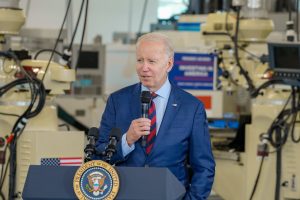U.S. President Joe Biden announced yesterday that he would soon make a trip to Vietnam, raising the likelihood that the two countries will announce a major upgrade in their diplomatic relationship before the year is out.
“I’m going to be going to Vietnam shortly, because Vietnam wants to change our relationship and become a partner,” Biden said on the sidelines of an event in Albuquerque, New Mexico, according to CNN. When asked by Reuters about Biden’s announcement, a White House spokesperson said there was “nothing further to share at this time.”
The current “comprehensive partnership” between Vietnam and the U.S. sits at the bottom of Vietnam’s three-tier diplomatic taxonomy, and Biden administration officials have been pushing to elevate ties with Vietnam to a “strategic” partnership this year, which marks the tenth anniversary of the establishment of the comprehensive partnership. Defense Secretary Lloyd Austin and Vice President Kamala Harris have both recently expressed their desire for an upgrade, and Secretary of State Antony Blinken, during his visit to Vietnam in April, said that an elevation of formal ties could occur “in the weeks and months ahead.”
Biden’s announcement comes after comments that he made at a fundraiser in Maine on July 28 that he received a call from the “head of Vietnam” who “desperately wants to meet with me when I go to the G-20,” referring to next month’s summit in New Delhi. “He wants to elevate us to a major partner, along with Russia and China,” Biden added.
The comments appear to have referred to a phone call between Biden and Nguyen Phu Trong, the head of the Communist Party of Vietnam (CPV). According to the White House, the conversation focused on “expanding the bilateral relationship, while working together to address regional challenges such as climate change, ensuring a free and open Indo-Pacific, and the deteriorating environmental and security situation along the Mekong.”
Until recently, many Vietnam watchers remained skeptical that Hanoi was less keen on an upgrade in relations than Washington, out of concern for the possible reaction from China and possible U.S. “interference” in Vietnamese domestic affairs.
As I noted at the time, Biden has mangled the distinction between the “strategic partnership” desired by the U.S. and the higher-ranking “comprehensive strategic partnerships” enjoyed by China and Russia. But the U.S. president’s comments lend credence to the view that an upgrade is on the cards for sometime later in the year.
An upgrade would mark a significant milestone in the strategic convergence between Vietnam and the U.S. over the past two decades, aligning the formal designation with the growing substance in the relationship. During this time, the two former wartime enemies have become close economic partners – the U.S. is by far the country’s largest export market – and the two nations are likely to extend this cooperation to the military realm, including discussions of potential U.S. weapons supplies to Vietnam. In 2016, President Barack Obama lifted a decades-long embargo on arms sales to the country.
































